- Home
- Roger Zelazny
Madwand (Illustrated) Page 2
Madwand (Illustrated) Read online
Page 2
“I don’t know . . . ” Pol began. “I do want to go, but—tomorrow?”
“Tomorrow.”
“Where would we be heading?”
“Over to the coast, I was thinking, and then north along it. You can pick up a lot of news in port cities—”
Pol raised his hand and cocked his head. Mouseglove nodded and rose to his feet.
“Your warning system still working?” Mouseglove whispered.
Pol nodded and turned toward the door.
“Then it can’t be any—”
The sound came again, and with it the form of a light-haired man appeared in the doorway, smiling.
“Good evening, Pol Detson,” he stated, raising his left hand and jerking it through a series of quick movements, “and good-bye.”
Pol fell to his knees, his face suddenly bright red. Mouseglove rounded the desk. Picking up one of the statuettes and raising it like a club, he moved toward the brown-cloaked stranger.
The man made a sudden movement with his right hand and the thief was halted, spun and slammed back against the wall to his left. The figurine fell from his grip as he slumped to the floor.
As this occurred, Pol raised his hands beside his cheeks and then gestured outward. His face began returning to its normal color as he climbed to his feet.
“I might ask, ‘Why?’ ” he said, his own hands moving now, rotating in opposite directions.
The stranger continued to smile and made a sweeping movement with one hand, as if brushing away an insect.
“And I might answer you,” said the other, “but it would take some coercion.”
“Very well,” said Pol. “I’m willing.”
He felt his dragonmark throb and the air was alive with strands. Reaching out, he seized a fistful, shook them and snapped them like a lash toward the other’s face.
The man reached out and caught them as they arrived. A numbing shock traveled up Pol’s arm and it fell limply to his side. The density of the strands between them increased to a level he had never before witnessed, partly obscuring his view of his opponent.
Pol made a large sweeping motion with his left hand, gathering in a ball of them. Immediately, he willed it to fire and cast the blazing orb toward the other.
The man deflected it with the back of his right hand and then flung both arms upward and outward.
The light in the room began to throb. The air became so filled with the lines of power that they seemed to merge, becoming huge, swimming, varicolored patterns obscuring much of the prospect, including the stranger.
As the pulse in his dragonmark overcame the numbness in his right arm, Pol sent his will through it, seeking a clearer image of his adversary. Immediately, the form of the other man began to glow, as the rainbow-work wove itself to closure. The room disappeared, and Pol became aware that his form, too, had become luminiscent.
The two of them faced one another across a private universe built entirely of moving colors.
Pol saw the man raise his hands, cupping them before him. Immediately, a green serpent raised its head from within them and slithered forth, moving in Pol’s direction.
Pol could feel a raw creation force moving all about him. He reached out and up, beginning a rapid series of shaping movements. A huge, gray bird came into being between his hands. He laid his will upon it and released it. It flashed forward and dove upon the snake, catching at it with its talons, striking with its beak. The serpent twisted its body and struck at the bird, missing.
Looking past this contest, Pol saw that the man was now juggling a number of balls of colored light. Even as the bird rose, bearing the struggling snake in its talons, to flap upward and merge with the kaleidescopic field which surrounded them, Pol saw the man cast the first blazing ball in his direction.
Smiling, Pol shaped a tennis raquet and saw a look of puzzlement cross his adversary’s features as he regarded the unfamiliar instrument.
He slammed the first ball back at the man just as the second was released. The sorcerer dropped the remaining balls and dove to the side to avoid the return. Pol batted the second one out-of-court as the man rolled forward and came to his feet, his right hand snapping outward, something long and black moving with it.
He swung the raquet and missed as the whip caught him about the neck and jerked him forward. He felt himself falling. Dropping the raquet, he reached for the choking thing that held him, to seize it, unwind it—
It jerked again and the world began to spin and darken. It continued to tighten, and he heard the sound of laughter, coming nearer . . .
“Not much of a contest,” he heard the other say.
Then there was an explosion and everything went black.
It was instructive to observe the exchange of forces between Pol and the visitor. Also, mildly unsettling, as it occurred to me that they might be inducing pain in each other. Yet, they had wanted to do it or they wouldn’t have. I was more interested in the manipulations than I was in their progressive wearing down of each other, because I felt that I might be able to engage in that sort of activity myself and I wished to be further informed. Its abrupt ending came as a surprise to me. Save for small, less complex creatures, I had not seen one being end another’s existence. Indeed, it had not occurred to me that these larger ones could be ended. I felt as if I should have taken a part in it, though on which side and in which direction, I could not say. I was also uncertain as to why I felt this way.
Where there had been three there were now two. I did not understand why they had done it, nor how the lance of force had come from the statuette to terminate the stranger before Mouseglove’s projectile reached his head.
Pol shook his head. His neck was sore. He rubbed it and opened his eyes. He was lying on the floor beside the desk. Slowly, he pushed himself into a seated position.
The stranger lay upon his back near the door, right arm outflung, left across his breast. A piece of his forehead was missing and his right eye was a crimson pool.
To his left, leaning against a bookshelf, Mouseglove stood rubbing his eyes. His right arm hung at his side and in his hand was the pistol he had carried away from Anvil Mountain. When he saw Pol move he dropped his left hand and smiled weakly.
“Are you all right?” he asked.
“I guess so. Except for a stiff neck. What about yourself?”
“I don’t know what he hit me with. It affected my sight for awhile. When I came around, the two of you seemed to be pulsing into and out of existence. I wasn’t able to get a shot at him till the last time he came through.” He replaced the weapon in a holster behind his belt and moved forward, extending his hand. “Everything seems normal enough now.”
Pol accepted his hand and rose. They both crossed the room and looked down at the dead man. Mouseglove immediately knelt and began searching him. After several minutes, he shook his head, unfastened the brown cloak and covered the man with it.
“Nothing,” he said, “to tell who he is or why he came. I take it you have no idea?”
“None.”
They returned to their seats and the wine flask, Mouseglove restoring the fallen figurine on the way.
“Either he had some reason for disliking you and came by to do something about it,” Mouseglove said, “or somebody else who feels that way sent him. In the first case, some friend of his might come along later to continue the work. In the second, another may be sent as soon as it is known that this one failed. Either way, it would appear that more trouble will be forthcoming.”
Pol nodded. He rose and removed a book from a shelf high on the lefthand wall. He returned to his seat and began paging through it.
“This one got through all of your alarm spells without giving warning,” Mouseglove continued.
“He was better than I am,” Pol said, without looking up from the book.
“So what is to be done?”
“Here,” Pol said, locating the page he sought and reading silently for a time. “I had been wondering about this for
some time,” he went on. “Every four years there is a gathering of sorcerers at Belken, a mountain to the northwest. Ever hear of it?”
“Of course—as a good thing to stay away from.”
“It will begin in about two weeks. I’ve decided to attend.”
“If they’re all like this fellow—” Mouseglove nodded toward the form upon the floor. “—I don’t think it would be a very good idea.”
Pol shook his head.
“The description makes it sound rather peaceful. Advanced practicioners discuss theory with one another, apprentices are initiated, rites involving more than one sorcerer get tried out, exotic articles are traded and sold, new effects demonstrated . . . ”
“The person behind this attempt on your life may be there.”
“Exactly. I’d like to settle this quickly. It may all be some sort of misunderstanding. After all, I haven’t been around long enough to have made any real enemies. And if the one I seek isn’t there, I may learn something about him—if there is such a person. Either way, it makes it seem worthwhile.”
“And that will be your only reason for going?”
“Well, no. I also feel the need for some formal training in the Art. Perhaps I can pick up a few pointers at something like that.”
“I don’t know, Pol . . . It sounds kind of risky.”
“Not going may prove even more dangerous in the long run.”
They heard a scraping noise and a popping sound from the courtyard. Both rose and moved to the window. Looking downward, they saw nothing. Pol seemed to stroke the air with his fingertips.
“The man’s mount,” he said finally. “It’s freed itself of whatever restraints he’d laid upon it and is preparing to depart.” He moved his hand rapidly, raising the other one as well, “Maybe I can get a line on it, trace it back to where it came from.”
The lesser kin of the dragon rose in the northeast and swept through a wide, rising arc, leftward.
“No good,” Pol said, lowering his hands. “Missed him.”
Mouseglove shrugged.
“I guess you won’t be going with me,” he said, “if you’ll be heading for that convocation, in the other direction.”
Pol nodded.
“I’ll leave tomorrow, too, though. I’d rather be moving about than staying in one place between now and then. So we can take the trail for a little way together.”
“You won’t be riding Moonbird?”
“No, I want to see something of the countryside, too.”
“Traveling alone also has its hazards.”
“I’d imagine they are fewer for a sorcerer.”
“Perhaps,” Mouseglove replied.
The dark form of the dragon-mount dwindled against the northern sky, vanished within a mountain’s shadow.
II.
That night, as I permeated the dead man’s body, seeking traces within his brain cells, I learned that his name had been Keth and that he had served one greater than himself. Nothing more. As I slid into and out of higher spaces, as I terminated a rat in a drainage channel in the manner I had recently learned, as I threaded my way among moonbeams in the old tower and slid along rafters in search of spiders, I thought upon the evening’s doings and on all manner of existential questions which had not troubled me previously.
The energies of the creatures which I had taken had a bracing effect upon my overall being. I wandered through new areas of thought. Other beings existed in multitudes, yet I had never encountered another such as myself. Did this mean that I was unique? If not, where were the others? If so, why? From whence did I come? Was there a special reason for my existence? If yes, what could it be?
I swirled across the ramparts. I descended to the caverns far below and passed among the sleeping dragons and the other creatures. I felt no kinship with any of them.
It did not occur to me until much later that I must possess some particular attachment to Rondoval itself, else I might long ago have wandered off. I realized that I did prefer it and its environs to those other portions of the countryside into which I had ventured. Something had kept calling me back. What?
I returned to Pol’s sleeping form and examined him very carefully, as I had every night since his arrival. And I found myself, as always, hovering above the dragonmark upon his right forearm. It, too, attracted me. For what reason, I could not say. It was at about the time of this man’s arrival that I had begun the movement which had culminated in my present state of self-awareness. Was it somehow his doing? Or—the place having been deserted for as long as it had been—would the prolonged presence of anyone have worked the same effect within me?
My desire for purpose returned to me strongly. I began to feel that my apparent deficiency in this area might have been accidental, that perhaps I should possess a compulsion, that there was something I should be doing but had somehow lost or never learned. How significant, I wondered, was this feeling? Again, I was uncertain. But I began to understand what had produced my present attitude of inquiry.
Pol would be departing on the morrow. My memories of a time before his time had already become dim. Would I return to my more selfless state when he left? I did not believe so, yet I was willing to concede that he had played some part in my awakening into identity.
I realized at that moment that I was trying to make a decision. Should I remain at Rondoval or should I accompany Pol? And in either case, why?
I tried to terminate a bat in flight but it got away from me.
The two of them took the northern trail on foot that morning, traveling together through the pass and downward to the spring-touched green of the forest to the place of the crossroads Pol had marked upon the map he bore.
They rested their packs against the bole of a large oak, still darkly damp with the morning dew, and considered the mists which dwindled and faded even as they watched, while the sun became a bright bulge upon the slope of a mountain to their right. From somewhere behind them the first tentative notes of birdsong were commenced and then abandoned.
“You will be out of the hills by evening,” said Pol, looking to the right. “It will be a few days before I get down, and then I’ll have to climb again later. You’ll be basking in the sea breeze while I’m still shivering my ass off. Well, good luck to you and thanks again—”
“Save the speech,” said Mouseglove. “I’m coming along.”
“To Belken?”
“All the way.”
“Why?”
“I allowed myself to get too curious. Now I want to see how it all ends.”
“It may well end indeed.”
“You don’t really believe that or you wouldn’t be going. Come on! Don’t try to talk me out of it. You might succeed.”
Mouseglove raised his pack and moved off to the left. Shortly, Pol joined him. The sun looked over the mountain’s shoulder and the gates of dawn were opened. Their shadows ran on before them.
That night they camped within a stand of pine trees, and Pol had a dream which felt like no dream he had ever known before. There was a clarity and a quality of consciousness involved which spun it past his inner eye with a disturbing simulation of reality, while in all aspects it was invested with a foreboding air of menace and yet possessed him with a certain dark joy.
Seven pale flames were moving in slow procession widdershins about him, as if summoning him, spirit fashion, to appear in their midst. He rose up slowly out of his body and stood like a bloodless image of himself. At this, they halted and left the ground. He followed them to treetop height and beyond. Then they escorted him northward, moving higher and faster beneath a sky filled with palely illuminated clouds. Grotesque shapes seemed to fill the trees below, the mountains about him. The wind made a whining sound and black forms flitted out of his way. The terrain rippled in dark waves as his speed increased. The wind became a howling thing, though he felt neither cold nor pressure from it.
At last, a huge, dark form loomed before him, set halfway up a mountainside, dotted here and t
here with small illumination; walled, turreted, heavy, high, it was a castle at least the size of Rondoval and in better condition.
There followed a break in his dream-awareness from which he recovered after an eon or a moment to a feeling of cold, of dampness. He stood before a massive double-door, heavily iron-bound and hung with huge rings. It was inscribed with the figure of a serpent, spikes driven through it; the crucified form of a great bird hung above it. Where it was located, he had no idea, but it seemed suddenly familiar—as though he had glimpsed it repeatedly in other dreams, forgotten until this instant. He swayed slightly forward, realizing as he did that the chill he experienced hung about the Gate itself like an invisible aura, increasing perceptibly with each tiny movement he made toward it.
The flames burned silently, sourcelessly, at either hand. He was overwhelmed with a desire to pass through the Gate, but he had no idea as to how this might be accomplished. The doors looked for too formidable to yield to the strength of any solitary mortal . . .
He awoke cold and wondering, pulling his covering higher and drawing it more tightly about him. The next morning he remembered the dream but did not speak of it. And that night it was partly repeated . . .
He stood again before the dusky Gate, with the recalled sensations but few specific images of his journey to the place. This time he stood with his arms upraised, pleading in ancient words for them to open before him. With a mighty creaking they obeyed, moving outward a short distance, releasing a small breeze and an icy chill along with tendrils of mist and a sound of distant wailing. He moved forward to enter . . .
On each night of that first week on the road, he returned to that dream and traveled further into it, losing his flame-like companions when he passed beyond the Gate. Alone, he drifted across a blasted landscape—gray and bronze, black and umber—beneath a dark, red-streaked sky where a barely illuminated, coppery orb hung still in what could be the west. It was a place of shadow and stone, sand and mist, of cold and wailing winds, sudden fires and slow, crawling things which refused to register themselves upon his memory. It was a place of sinister, sentient lights, dark caves and ruined statues of monstrous form and mien. Some small part of him seemed to regret that he took such pleasure in the prospect . . .

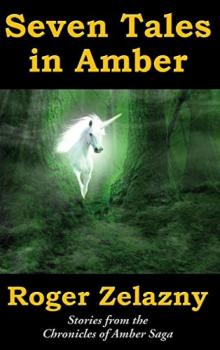 Seven Tales in Amber
Seven Tales in Amber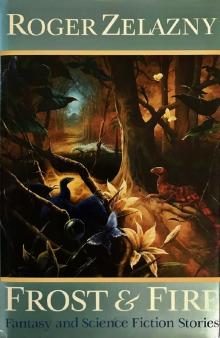 Frost and Fire
Frost and Fire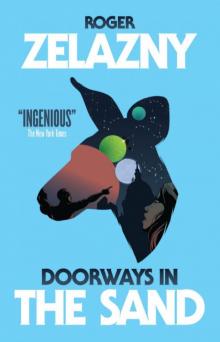 Doorways in the Sand
Doorways in the Sand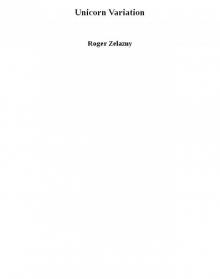 Unicorn Variation
Unicorn Variation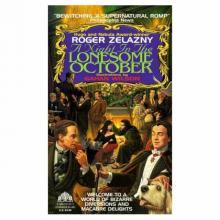 A Night in the Lonesome October
A Night in the Lonesome October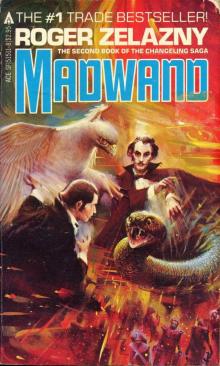 Madwand
Madwand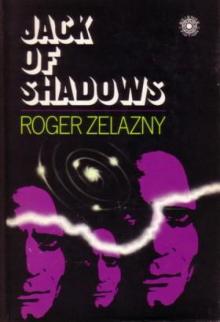 Jack Of Shadows
Jack Of Shadows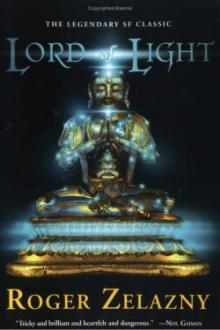 Lord of Light
Lord of Light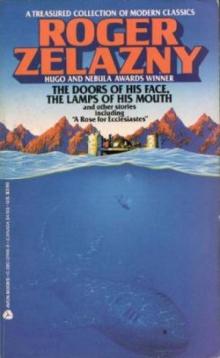 The Doors of His Face, The Lamps of His Mouth and Other Stories
The Doors of His Face, The Lamps of His Mouth and Other Stories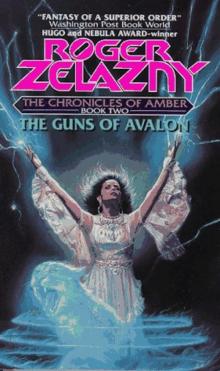 Guns Of Avalon tcoa-2
Guns Of Avalon tcoa-2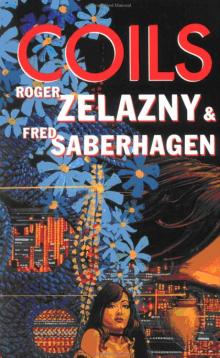 Coils
Coils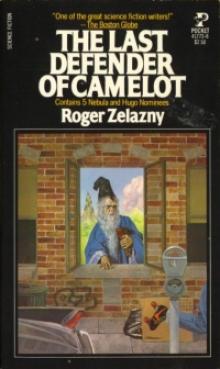 The Last Defender Of Camelot
The Last Defender Of Camelot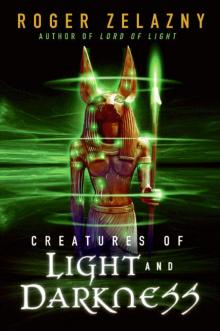 Creatures of Light and Darkness
Creatures of Light and Darkness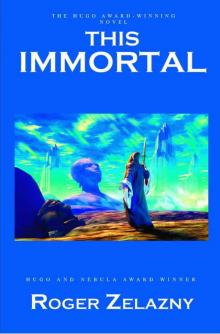 This Immortal
This Immortal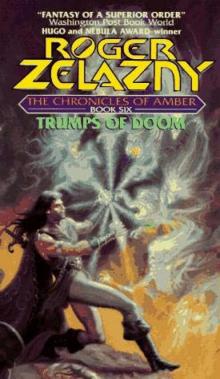 Trumps of doom tcoa-6
Trumps of doom tcoa-6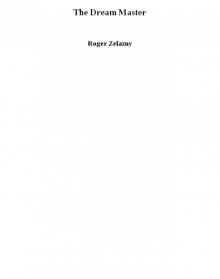 The Dream Master
The Dream Master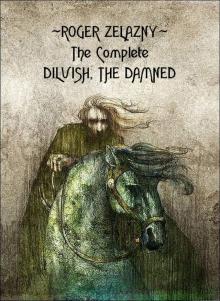 The Complete Dilvish, The Damned
The Complete Dilvish, The Damned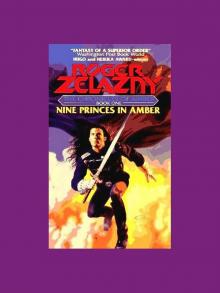 Nine Princes in Amber
Nine Princes in Amber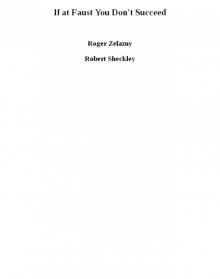 If at Faust You Don't Succeed
If at Faust You Don't Succeed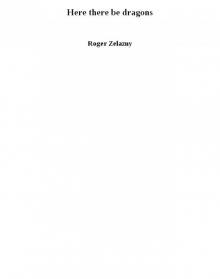 Here there be dragons
Here there be dragons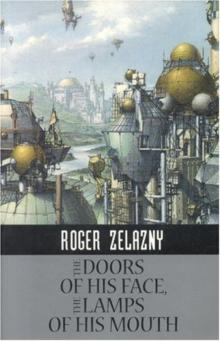 The Doors Of His Face, The Lamps Of His Mouth
The Doors Of His Face, The Lamps Of His Mouth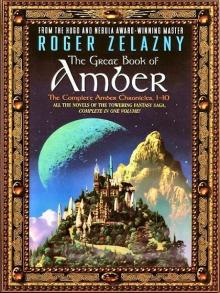 The Great Book of Amber - Chronicles 1-10
The Great Book of Amber - Chronicles 1-10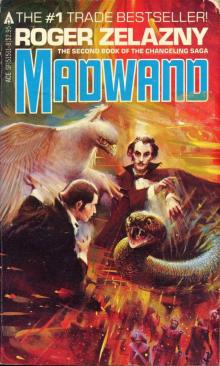 Madwand (Illustrated)
Madwand (Illustrated)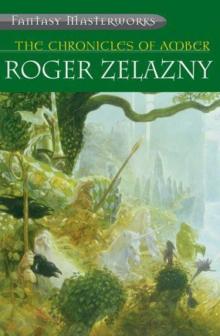 The Chronicles of Amber
The Chronicles of Amber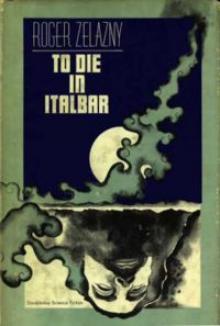 To Die In Italbar
To Die In Italbar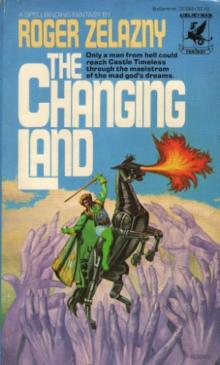 The Changing Land
The Changing Land The Furies
The Furies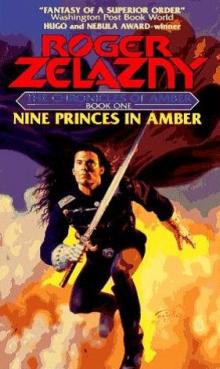 Nine Princes In Amber tcoa-1
Nine Princes In Amber tcoa-1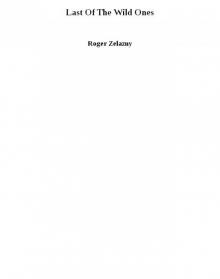 Last Of The Wild Ones
Last Of The Wild Ones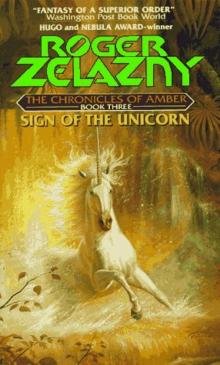 Sign of the Unicorn tcoa-3
Sign of the Unicorn tcoa-3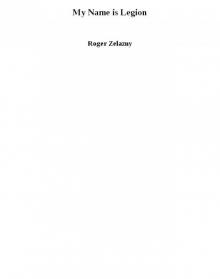 My Name is Legion
My Name is Legion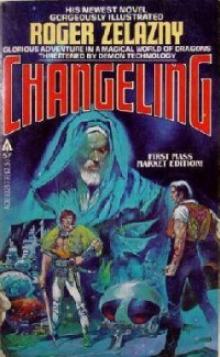 Wizard World 1: Changeling
Wizard World 1: Changeling Changeling
Changeling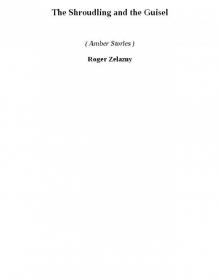 The Shroudling and the Guisel (amber stories)
The Shroudling and the Guisel (amber stories)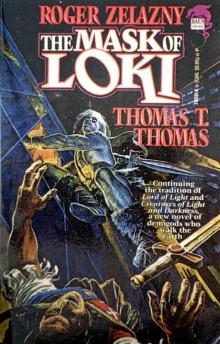 The Mask of Loki
The Mask of Loki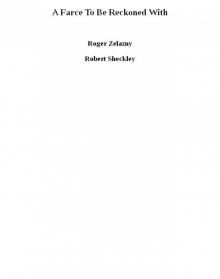 A Farce To Be Reckoned With
A Farce To Be Reckoned With Roadmarks
Roadmarks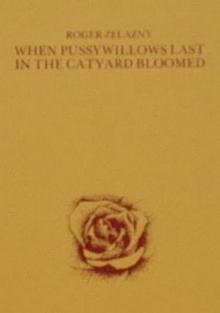 When Pussywillows Last in the Catyard Bloomed (rtf)
When Pussywillows Last in the Catyard Bloomed (rtf)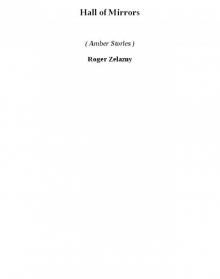 Hall of Mirrors (amber stories)
Hall of Mirrors (amber stories)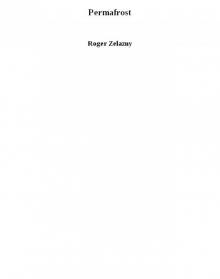 Permafrost
Permafrost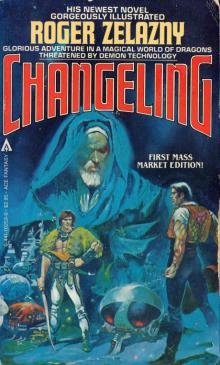 Changeling (Illustrated)
Changeling (Illustrated)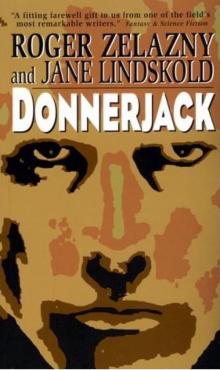 Donnerjack
Donnerjack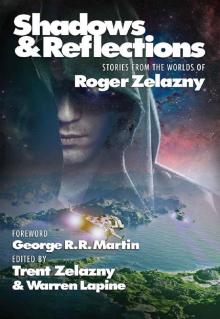 Shadows & Reflections: A Roger Zelazny Tribute Anthology
Shadows & Reflections: A Roger Zelazny Tribute Anthology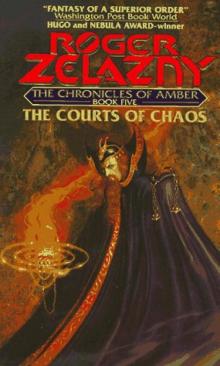 The Courts Of Chaos tcoa-5
The Courts Of Chaos tcoa-5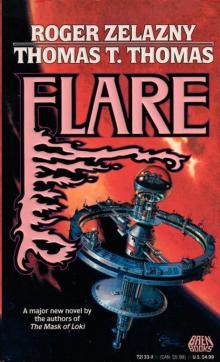 Flare
Flare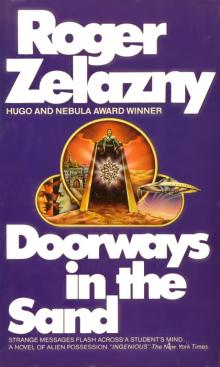 Doorsways in the Sand
Doorsways in the Sand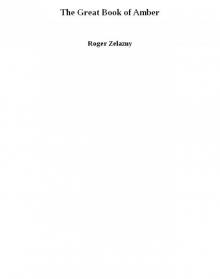 The Great Book of Amber
The Great Book of Amber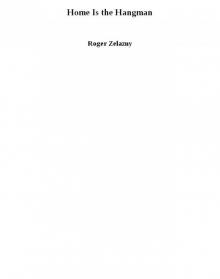 Home Is the Hangman
Home Is the Hangman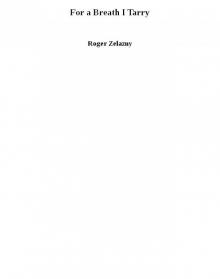 For a Breath I Tarry
For a Breath I Tarry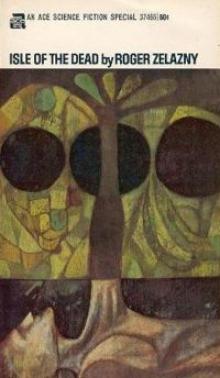 Isle Of The Dead
Isle Of The Dead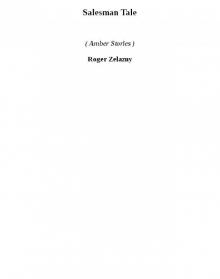 Salesman Tale (amber stories)
Salesman Tale (amber stories)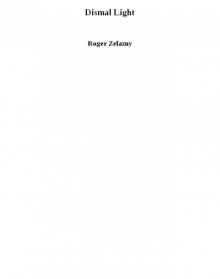 Dismal Light
Dismal Light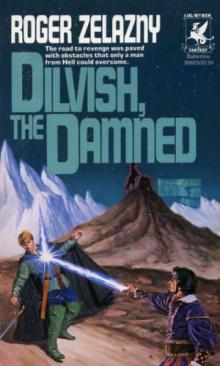 Dilvish, The Damned
Dilvish, The Damned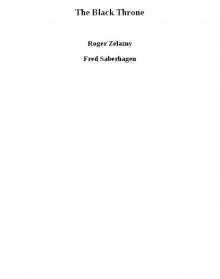 The Black Throne
The Black Throne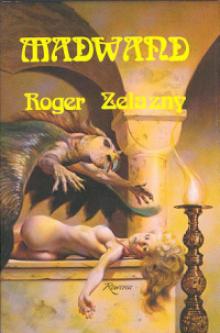 Wizard World 2: Madwand
Wizard World 2: Madwand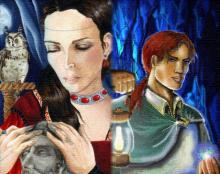 The Salesman's Tale
The Salesman's Tale